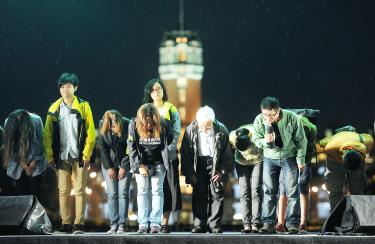Former Democratic Progressive Party (DPP) chairman Lin I-hsiung (林義雄) yesterday afternoon announced the end of his hunger strike against the continued construction of the Fourth Nuclear Power Plant and said he was grateful for the “phenomenal antinuclear effort” of Taiwanese over the past two weeks.
Lin said he would continue to fight what he called the injustice of President Ma Ying-jeou’s (馬英九) administration.
“The struggle of the millions of Taiwanese over the past two weeks has been unprecedented, touching and admirable. As a response to the people’s sincere caring, I have decided to end my hunger strike and vow to spend the rest of my life working with Taiwanese to safeguard Taiwan’s democracy and sovereignty,” Lin said in a press release posted on his Web site at about 2:30pm.
Lin remains at National Taiwan University Hospital after being admitted to the hospital on Monday afternoon for examinations. He is reported to be in stable condition.
There has been no word on when he might return to his home in Yilan to recuperate.
The 73-year-old announced plans for a hunger strike on April 15 in an effort to promote a nuclear-free homeland and the termination of the power plant in New Taipei City’s Gongliao District (貢寮). He began his fast on April 22, vowing not to end the fast until Ma announced a halt to the construction of the plant.
Lin’s crusade has prompted several large-scale antinuclear protests. Police have come under harsh criticism for allegedly resorting to excessive violence and water cannons to evict crowds from the protest sites.
The Ma administration on Sunday announced it would halt construction at the Gongliao plant.
Lin and other antinuclear advocates have said they are not satisfied with the government’s response, accusing Ma of “playing with words” and being insincere with the proposed shutdown because it leaves room for resuming construction and evading legislative supervision.
However, Lin yesterday said the antinuclear campaign has reached its preliminary goal of stopping the construction.
What Taiwanese must do next is to prevent Ma from jeopardizing Taiwan’s democracy and selling out the nation’s sovereignty, Lin said.
He said the president always takes the opposite view of mainstream public opinion.
Taiwanese “have now been awakened,” and with determination and courage, there will be “unstoppable people’s power” against an authoritarian national leader, Lin said.
He said Taiwanese should work to develop trust, solidarity and enhance their capabilities before turning to new goals, including the passage of an amendment to the Referendum Act (公民投票法), blocking passage of a special statute on free economic pilot zones, promoting an amendment to the Constitution by organizing a citizens constitutional conference and demanding a pledge on a nuclear-free homeland from all the candidates in the seven-in-one elections scheduled for November.
DPP Chairman Su Tseng-chang (蘇貞昌), former DPP chairperson Tsai Ing-wen (蔡英文) and Taiwan Solidarity Union Chairman Huang Kun-huei (黃昆輝) all said they were relieved to learn Lin had ended his hunger strike and expressed their appreciation for Lin’s devotion to the cause.
Su said the DPP would focus on amending the Referendum Act, as passing a special statute on the Fourth Nuclear Power Plant would no longer be necessary.
Huang said his party’s focus would be a special statute governing the free economic pilot zones and a constitutional conference.
The National Nuclear Abolition Action Platform, which began a rally on Ketagalan Boulevard in Taipei on Saturday in support of Lin, said yesterday evening that it would leave the boulevard at 9pm, but the group will monitor the government’s pledge to halt work on the plant.
Green Citizens’ Action Alliance secretary-general Tsuei Su-hsin (崔愫欣) said they will also continue to demand that the lifespan of the three operating plants not be extended, that a cross-party monitoring committee be established to ensure construction work at the fourth plant ends and the Referendum Act be amended.
Although the protest on Ketagalan has ended, the social movements for abolishing nuclear power will continue, and the groups condemn state violence against non-violent public protests, she said.
Meanwhile, Lin’s announcement drew many positive responses in online forums and on Facebook, with many netizens praising his decision and wishing him well.
Additional reporting by Lee I-chia
Source: Taipei Times - 2014/05/01





















